How to Go Zero Waste and Do Less Dishes
If I had to say there was a drawback to living plastic-free or zero waste, then I would say it is this: the dishes.
There’s not really any way round it. Choose reusables and you’ve got to wash them up. The more reusables, the more washing up.
Sigh.
It’s not that I hate washing up. I love washing up… well, once it’s done and put away. (I’m less of a fan of the dirty dishes.) It’s not that I mind the process itself either. It’s just that there are always dishes.
Always. Dishes.
Still, once we’ve accepted that there will be dishes, we can do things to ensure there are less dishes. The less the merrier, I think! (That’s not a saying, but it should be.) Because we’re not going back to single-use plastic and disposables, right?
So let’s do what we can to make less dishes.
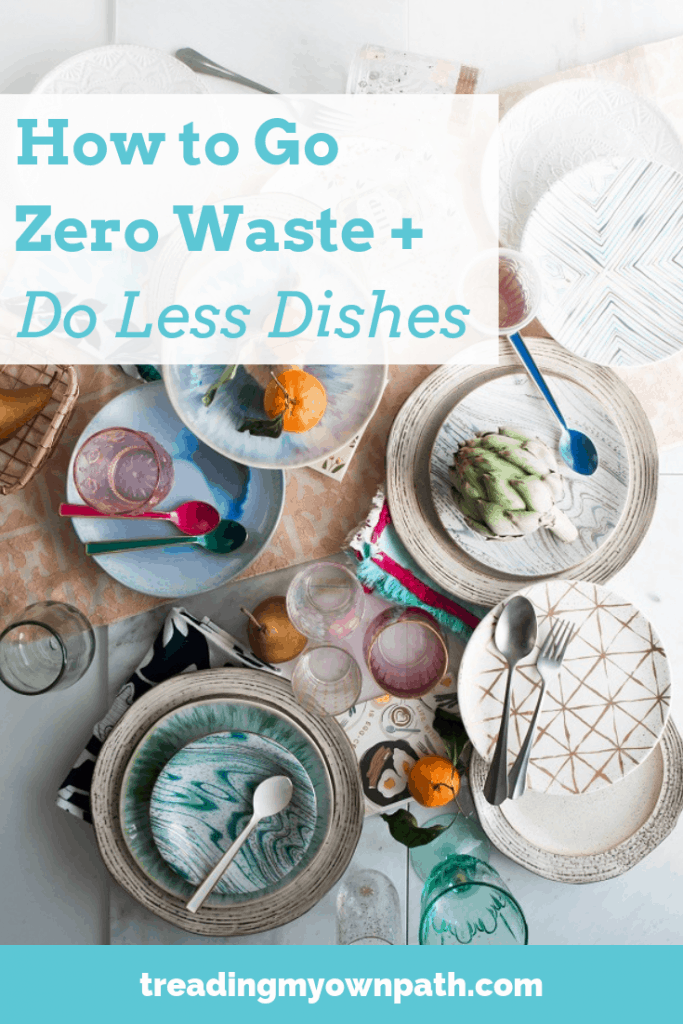
To Dishwasher or Not to Dishwasher?
As soon as I mention dishes, someone brings up dishwashers. Yes, I’ve read the studies, and it is true that some dishwashers use less water than filling a sink and doing the dishes by hand.
A modern water-efficient dishwasher might use 15 litres per cycle. Depending on the size of your sink, how careful you are with water and how long it takes for the water to run hot, plus any rinsing, hand washing can use a fair bit more.
There are other factors. Dishwashers use electricity. They are also big chunks of metal and plastic (those resources had to be extracted from the ground), and take up a fair amount of space in a small kitchen.
I have solar hot water, meaning it comes from a tank heated by solar panels whereas a dishwasher would run from the mains. I have a fairly minimalist kitchen, and I’d run out of things before the dishwasher is even full. (This is by design – for creating less dishes. I’ll come back to this.)
Plus, I have unresolved childhood trauma around dishwashers. Don’t ask ;) All things considered, a dishwasher won’t work for me, and I’m happy with my sink.
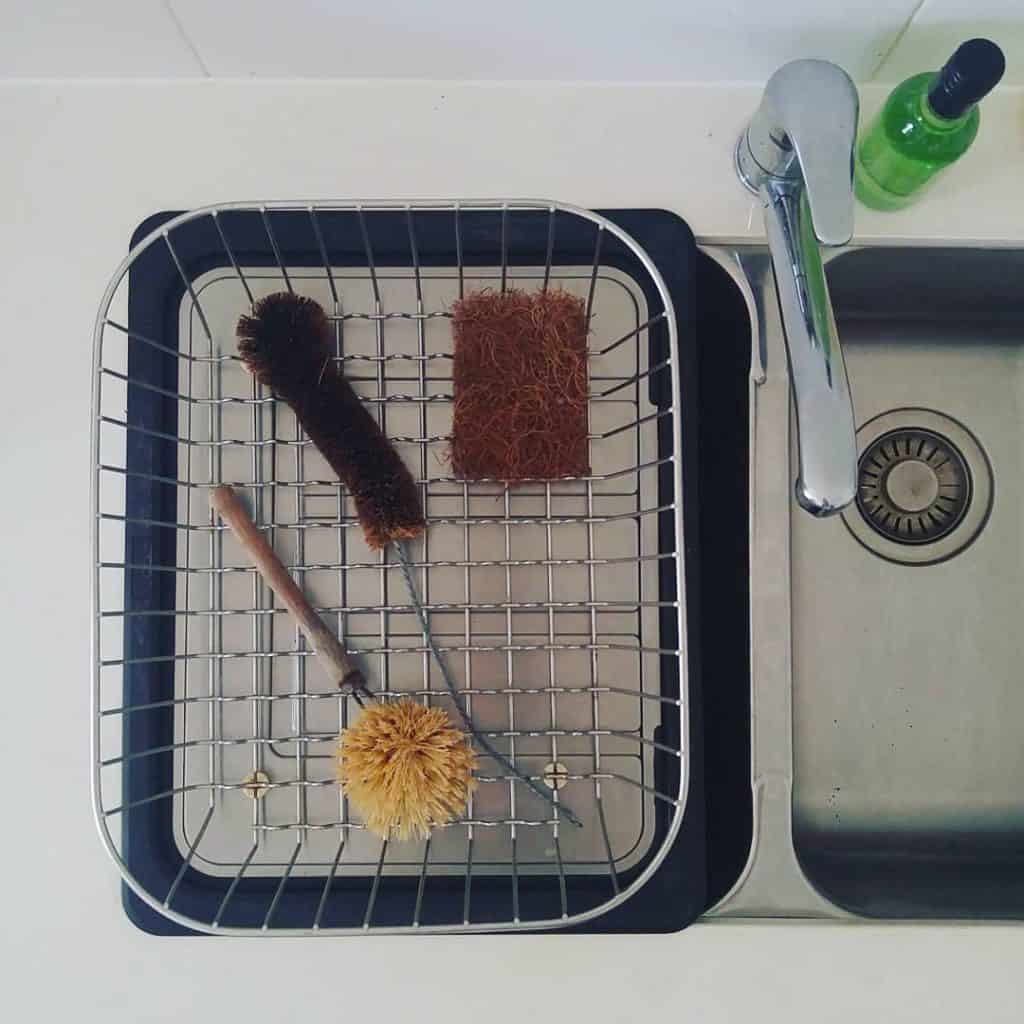
If you have a big family, you already have a dishwasher or you know that a dishwasher will be the thing that makes less waste possible for you, go for it! Look after it, service it, get it fixed and make it last.
For those who have taken the path of more dishes and no dishwasher, here’s my tips for keeping them to a minimum.
Not Dirty? Don’t Wash It.
Now I’m not advocating for risking food poisoning here, but we can be sensible about these things. And if something isn’t dirty, we can get away with not washing it.
Level 1. The wipe.
Does it need to be washed, or could it just be wiped? Plates that have had toast or dry crackers tend to accumulate nothing more than a few breadcrumbs. These can be brushed off.
The same goes for lunchboxes that have had sandwiches in them, and bowls used to weigh out dry ingredients. Sometimes I’ll wipe out a jar from the pantry rather than wash it if I know it is something I use often (pasta, oats).
I find a wipe with a clean dishcloth or a dry tea towel is enough.
Level 2. The rinse.
Some things can pass with a quick rinse, particularly bowls, plates and cutlery (not forks) if rinsed straight after using. It depends what is was used for and by whom of course. I’d be happy to rinse a spoon that I’d used to measure out coffee, less so if someone had just eaten a dessert with it.
I’m also happy to quickly rinse out pans that have steamed vegetables or boiled pasta, too.
Oh, and I save the rinse water and add to the compost or worm farm.
Level 3. Wash it up.
Actual washing up is best for anything baked on and greasy, most cooking pans, dinner cutlery, day-old lunchboxes, pantry jars that have been stored to a while, anything sticky.
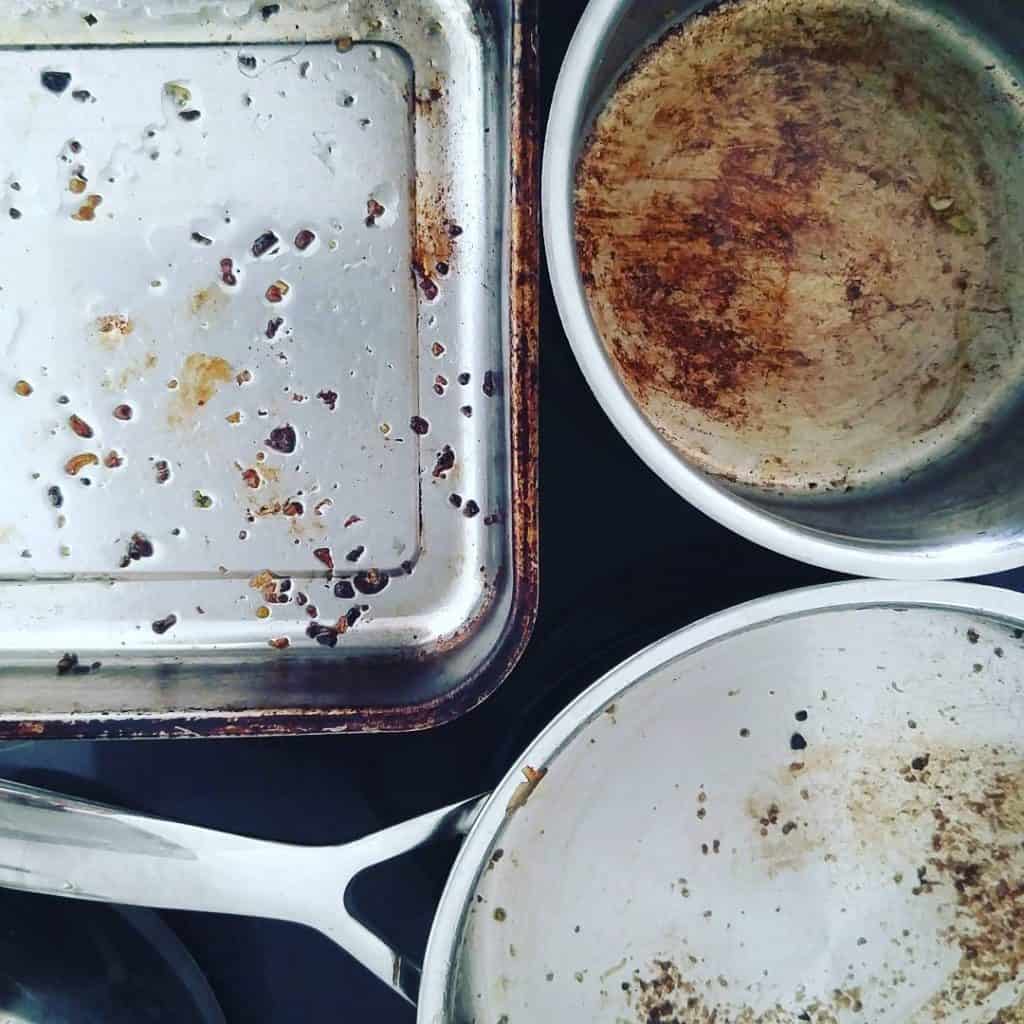
Coming back to food poisoning, the highest risk foods include ice-cream, rice and animal products (meat, fish, eggs, dairy). I’d recommend washing up anything that contained these foods.
Own Less Stuff
There are two reasons why owning less stuff helps with the dishes. The first is that with less stuff, you use up all the stuff more quickly and need to wash it before your kitchen gets swallowed by unwashed dishes.
This doesn’t create less washing up, but it does create less overwhelm, and keeps things more manageable.
The second is that when your stuff is all used and dirty and you need something but can’t be bothered to do the dishes, you’ll spot clean that one item – or just use it again as is – which means the number of dishes don’t get any bigger. And some things get used again before being washed up.
If I’m out of side plates for lunch I’ll figure out which one had toast for breakfast, dust the crumbs off and use that again. Same for mugs and making tea. No net gain in dishes.
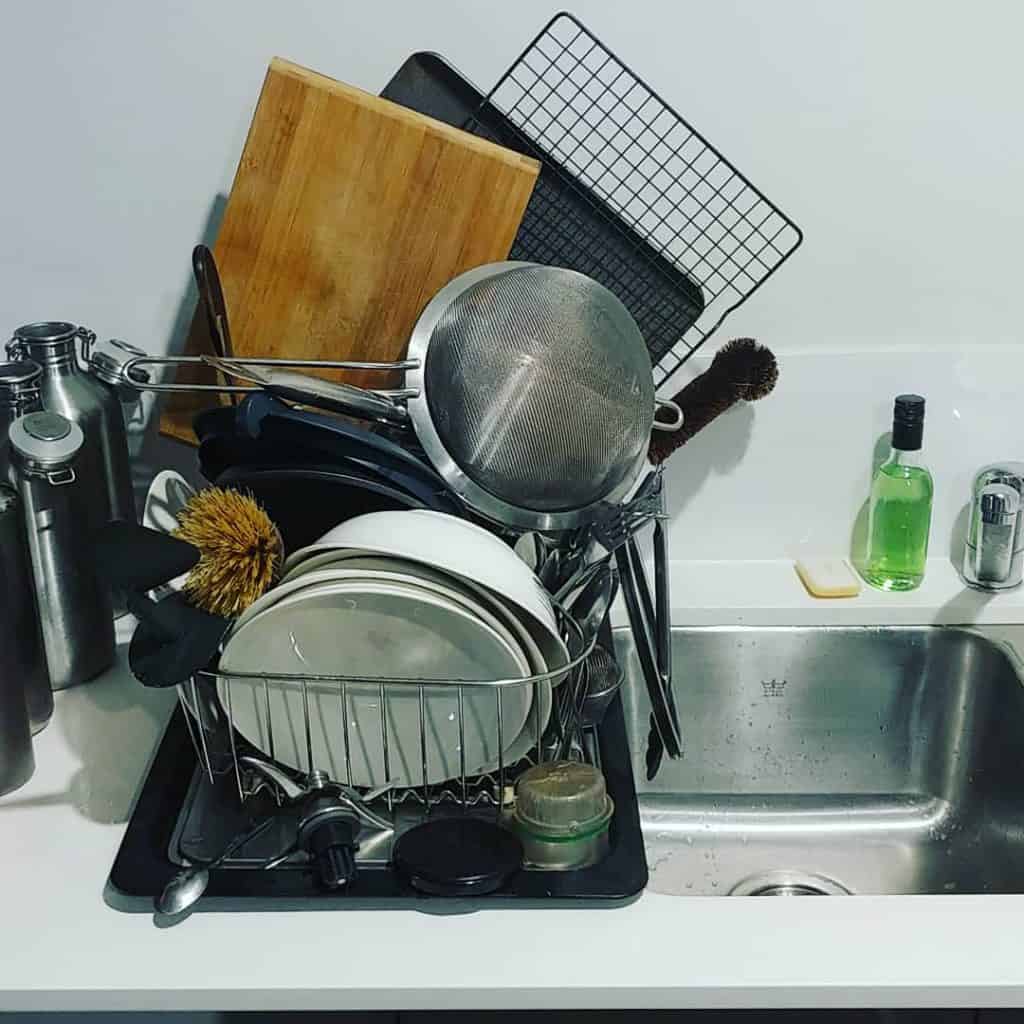
Eat Like No-One is Watching
Well, when no-one is watching, does it matter if you use a proper plate? Or could you just eat out of the saucepan? Classy no, but if it saves on dishes then I am willing to make these sacrifices.
Quite often if I reheat my lunch I’ll eat it out of the pan, or if it was stored in a container I’ll then eat it in that rather than dirty a plate. If there’s the last of something coming out of the fridge I’ll eat that straight out of the container, too.
Me 1, dishes 0.
Make Your Dishes Multi-Purpose
If try to avoid washing something up after it has been used once. If I can get a few uses out of something before it heads to the dirty dishes pile, that’s a win. If I’ve used a bowl to weigh something out, I’ll try to use that same bowl for the meal. I might even store leftovers in it, in the fridge.
I’m a big fan of using the saucepan I used for cooking as the leftover container – meaning, I stick the saucepan straight in the fridge. Especially if the food can be reheated in the saucepan. Otherwise I’m washing the pan, putting the leftovers in a container, emptying the contents back into the pan the next day and washing it all again.
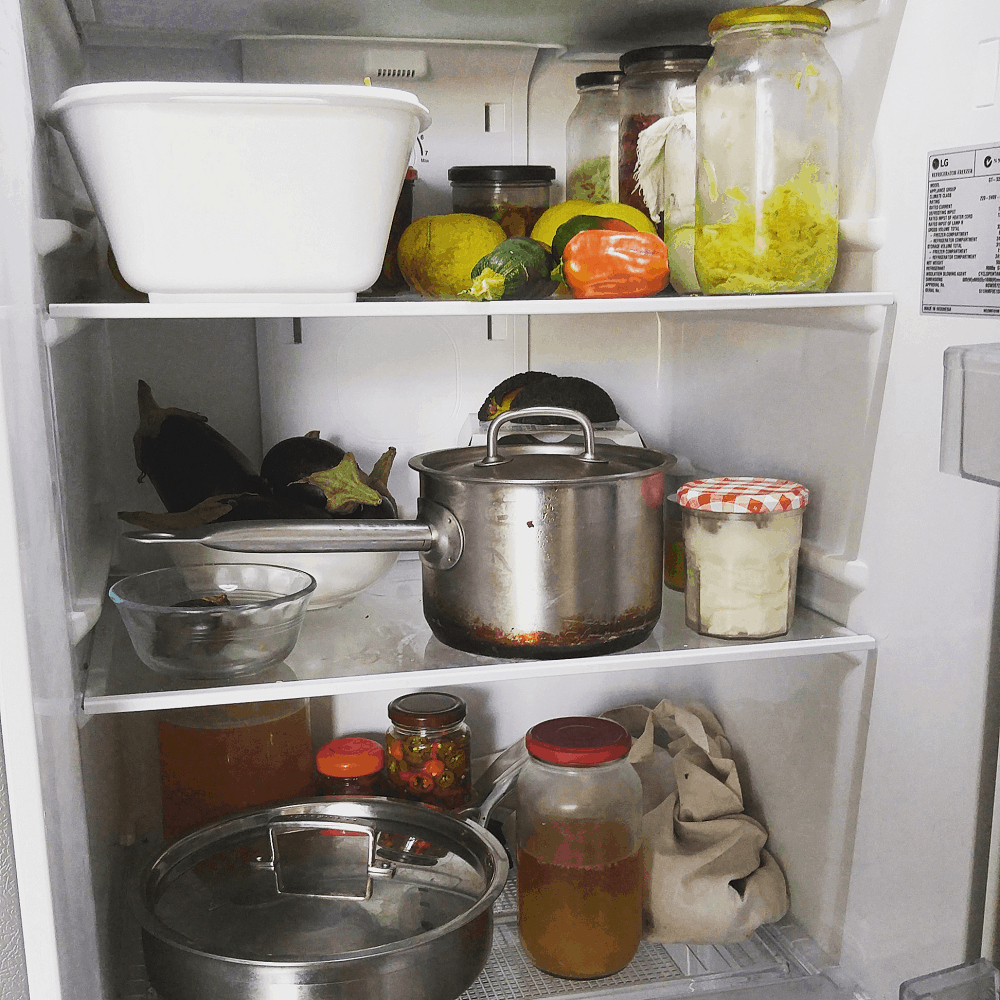
Saucepans are excellent stainless steel storage containers that we already own.
I do the same thing with glass jars. Just finished off the pasta? That jar is good for leftovers in the fridge.
Plan Your Meals with the Dishes in Mind
Just thinking about all the prep you need to do in advance can save on dishes, particularly with trickier-to-clean items like blenders. I like to time my prep to maximise the making of stuff and minimising the washing up.
For example, I might make nut butter, scrape that out of the blender and then make nut milk (usually with a different type of nut). Once emptied, I might make pesto, and then whizz up some tomatoes. Four things and one wash.
I don’t need to eat all these things that day, as they will keep in the fridge for a few days. Rinsing out a jar later is less onerous than cleaning the blender. Again.
Make Extra
I never make a one portion meal. Not only because of dishes but also because it is never twice as much work to make twice as much. I always make extra, and pop the leftovers in the fridge or freezer for later.
Reheating something uses far less dishes than having to chop, steam, boil or stir-fry a bunch of different things every single meal.
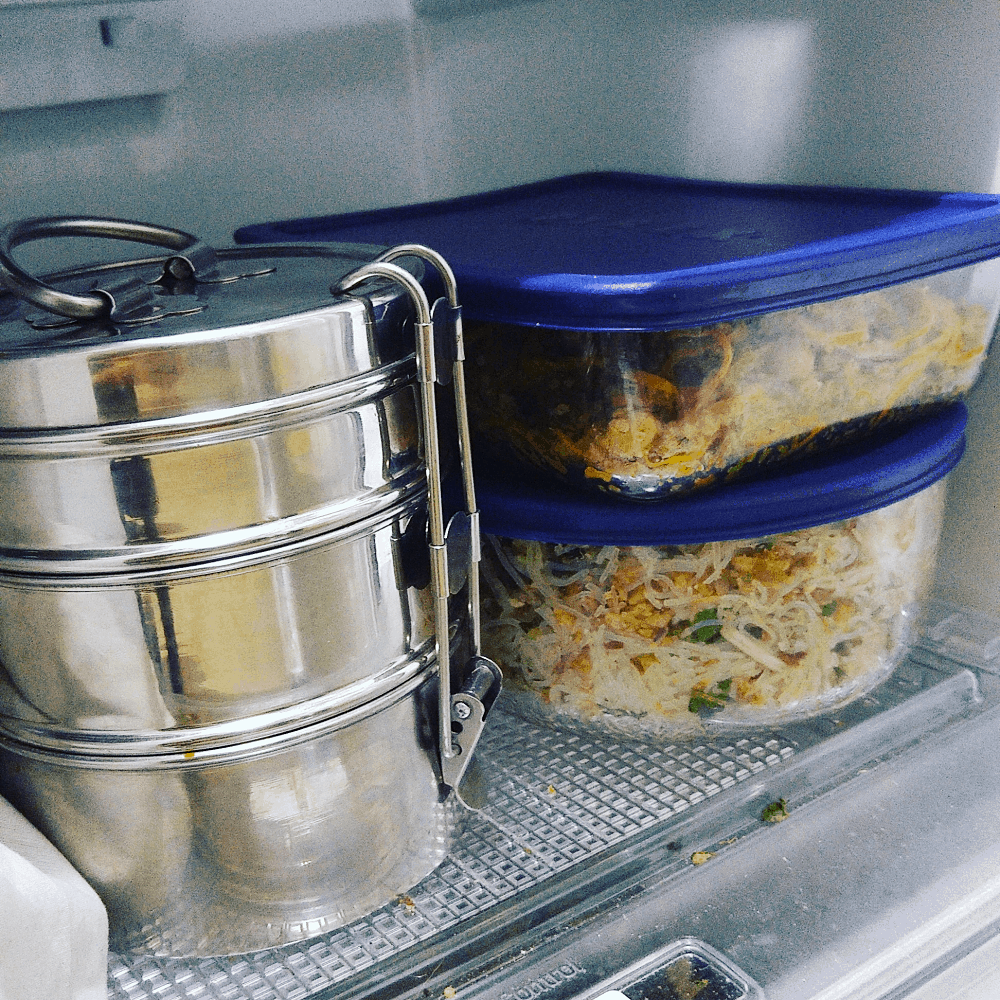
Plus, I am a messy cook. Stuff gets everywhere. I might as well trash the kitchen once, and then enjoy the relative tidyness for a few days.
Sometimes I’ll just double or quadruple the recipe. Other times I’ll just cook more of an ingredient. I always make a big pan of rice or quinoa, and keep the leftovers to make stir-fry or to go with something else the next day.
In an ideal world Sunday is my day to do this, when there is more time to make things and clean up. It feels good to start the week without an onerous pile of dishes every night. If that doesn’t work, it tends to be mid-week when I’m sick of the chaos!
Eat Leftovers Cold
I like leftovers cold. I don’t have a microwave, and to save on using a pan to heat things up I just started eating my leftovers cold. Pasta salad is a thing, rice salad is a thing, so it isn’t that strange not to heat things up.
It does depend on the weather – in the depths of winter I’m prepared to wash than pan for the heat it gives!
There’s no miraculous way to end the dishes, but there are little tweaks we can do to create less of them. On the plus side, there’s no hauling bags of trash to the kerb every week, and there’s no trashing of the planet, by contributing to the litter/landfill/plastic problem.
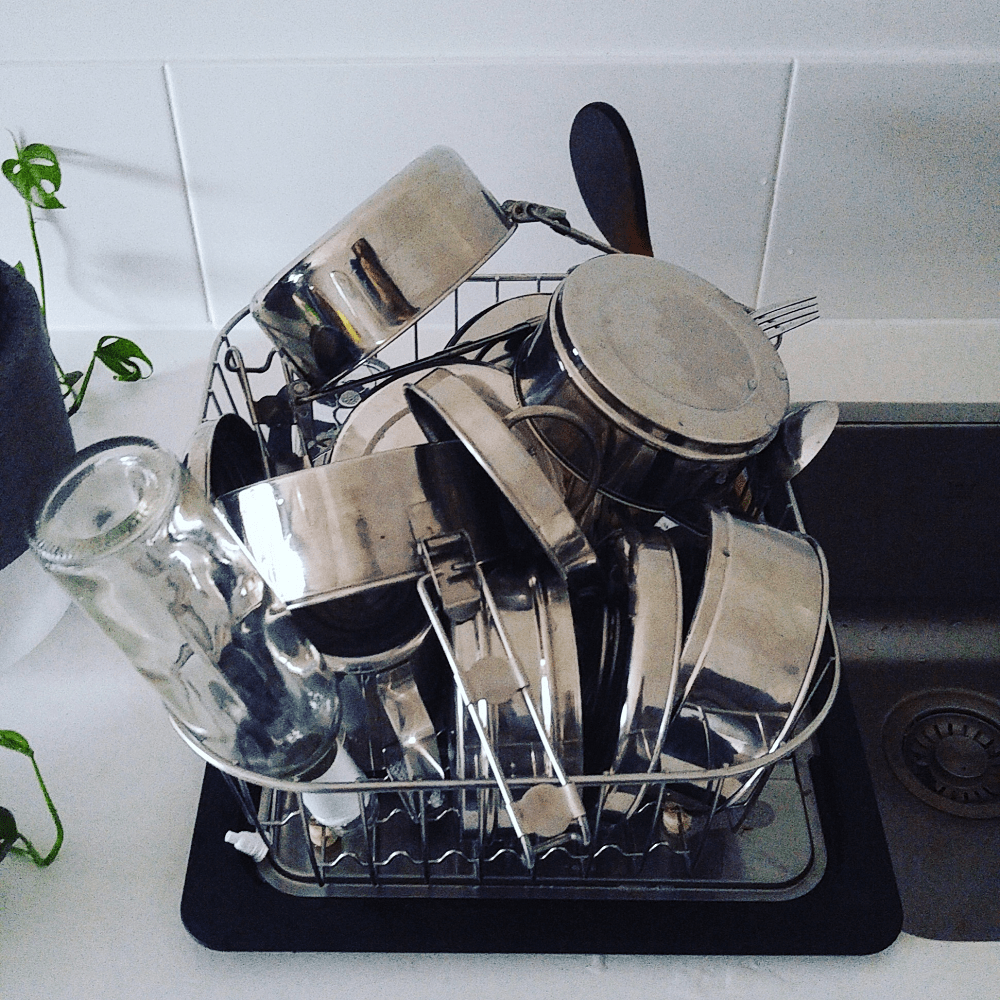
Plus there’s something quite satisfying about a gleaming stack of glass and stainless steel. And if the options are creating dishes or creating plastic pollution, I know where my choice lies.
Now I’d love to hear from you! If you have any tips for doing less dishes, we want to hear them! Do you have a dishwasher, or do you manage without? How do you keep the dishes under control? Please share your thoughts in the comments!
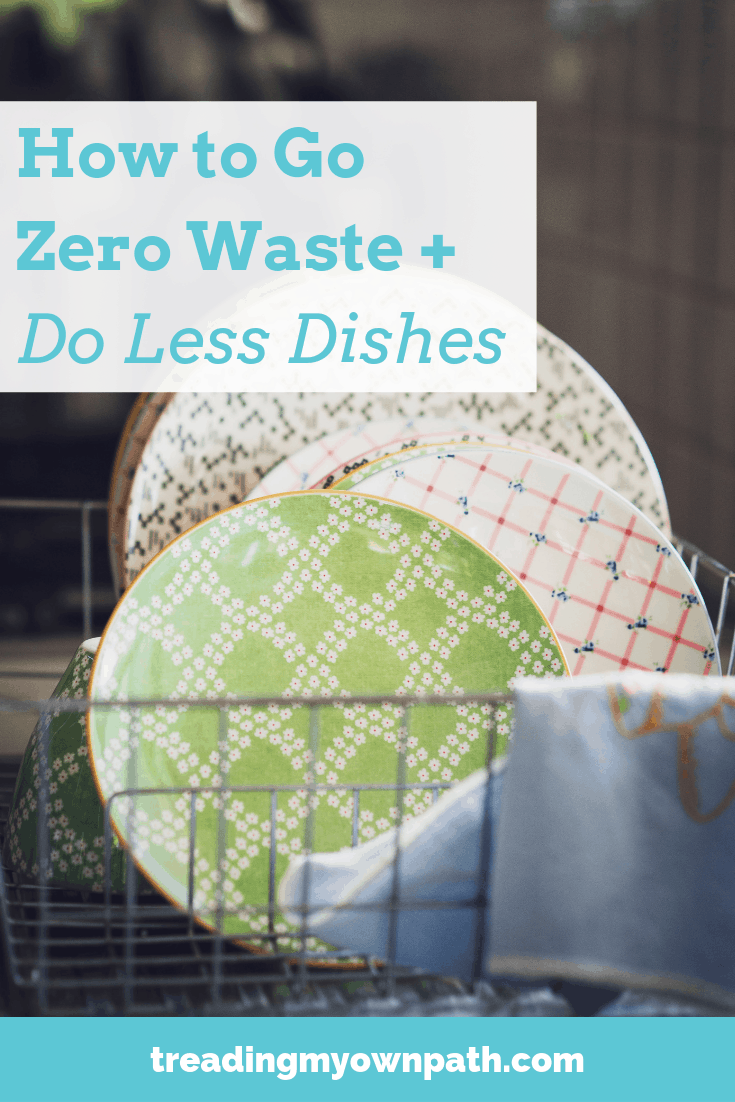

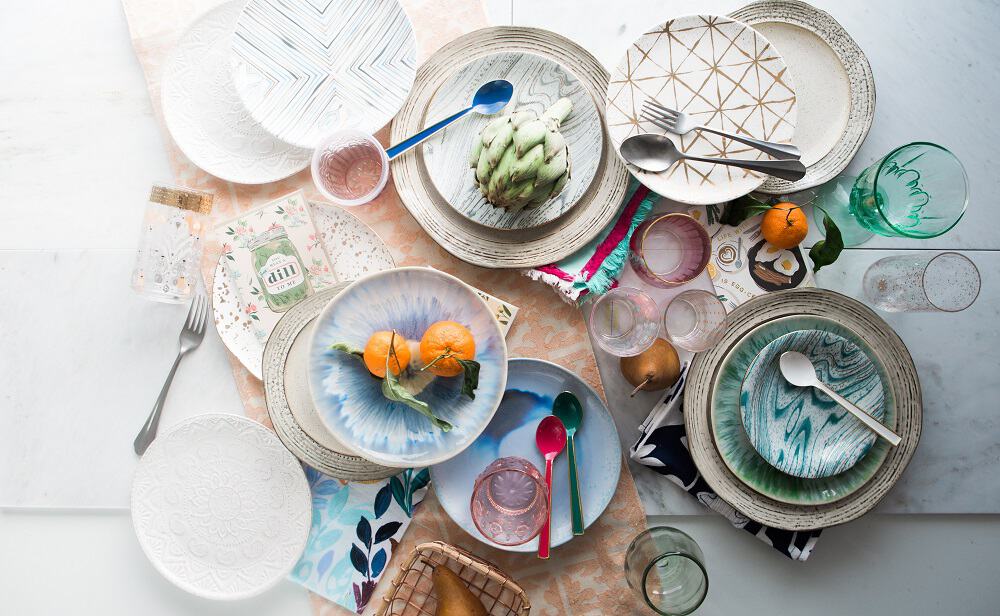
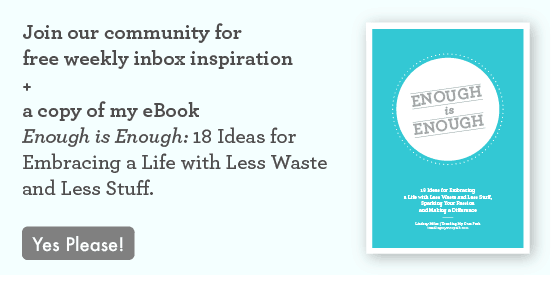




Thanks, Lindsay. I’ve been thinking about some of these issues, have made a bit of progress, and you’ve given me some new thoughts. I HATE washing up. It was different when I had a large sink, could fill a pan with nice suds, enjoy the warm water while looking out a window. (All sinks should have them!) Now it’s almost one-at-a-time in a small sink, dark area! One bad habit: putting tall spoons, knives, etc. IN the sink, then putting bowls on top – yuk – terrible idea! I recently started putting them upright in a used tin can so I can grab what I need to re-use. And if they stay there a day or so, I can live with that. =) Here’s to less dish-washing, fewer annoyances. =) Thanks, again, for your contributions.
Thanks for your comment Peg! My sink looks onto a blank wall too, and yes it makes such a difference when it looks out of a window and over a sunny garden! Sigh.
Drink water out of a drink bottle at the table. Each kid uses their own drink bottle and it doesn’t get washed every day. No glasses to wash. NB we have never actually managed it for more than a day but I know a family that does it consistently
I love this tip! I rarely use a glass to drink out of. I have two stainless steel beakers (leftover from an event I attended) and I use those sometimes, I think glass just gets fingerprints and looks grubby before it is. I do drink out of my bottles mostly. It’s only the occasional wine (or gin) I use a glass for ;)
Ahh love this post Lindsay. My fav is ‘eat like no one is watching So true! We had a few friends over for a BBQ and ran out of plates, but improvised with the empty platter plates and pots
Hehe, nothing beats eating outta the pan and saving on dishes, Tegan! ;)
My best buy on this theme – and, yes I know, but I use it at least three times a week! – was a slow cooker with a metal pan I can fry up onions etc in it on the hob, then put the pan into the slow cooker and carry on preparing the meal. No extra saucepan and it’s great for two-day curries.
I’ve also recently ‘discovered’ leftovers salad, usually eaten with a fork directly from the storage container. That’s a Bonne Maman jamjar though so it’s kinda pretty! I’ve collected three colours of the gingham lids now :-)
Sounds perfect Stephanie! I do like it when things are well designed and can be used like this.
On the topic of Bonne Maman jars… they have to be my faves. I have an opaque white glass one, slightly smaller than the regular jars and with a green gingham lid. No idea what was in it originally but I know I’ve had it since at least 2012! Probably a collector’s item! ;)
it’s interesting to see how different families/individuals prefer different ways of doing things. i often store leftovers in their cooking pans, i agree many things may be rinsed rather than scrubbed, i make multiple portion/meal amounts fo things when i cook, and i am happy to eat grain salads at room temperature. but i am not willing to give up the grace notes of having food on a plate, rather than hovering over a sink or eating it from a storage container; for me, part of the joy in cooking, serving, and eating good food comes from attractive dishes chosen to enhance the food. even if it’s just for me! when the old dishwasher couldn’t be repaired any more, we got the most durable, energy-efficient one we could find, and we use it only when full, probably every other day. as there are only two of us when my daughter is at uni, it can go a couple of days before it’s filled unless i have friends over for tea or cook an unusual amount of food for some event. so my hand-washing is limited to a couple of wine glasses, the cutting boards, and perhaps a large pan that would take up disproportionate room in the dishwasher most days. for me, this works well, and is much like our laundry choice: do laundry in the washing machine once per week, full loads only and in cold water, and air dry pretty much everything. using sensible laundering triage (jeans, trousers/skirts generally don’t need washing every time they are worn), even with a paper-free kitchen and cloth napkins we need do only 1-2 loads per week, maximum, sometimes less. i make my own dishwasher and laundry soaps, so there’s minimal waste and no nasty chemicals. i’m not giving up clean drinking glasses at meals, and plates, but we can all make choices that work for our families and for reducing waste and energy use, and no judgement!
Thanks so much for sharing! I love cooking but I have terrible presentation skills and tend to just slop everything all over the sides – so really, I’m not gaining anything from serving it up! Saying that, it depends what it is, what meal it is and how I’m feeling. Sometimes on a busy day I’ll just eat something cold straight outta the pan, but on other days I’ll take the time to slow down and create something that looks nice and sit at the table.
I guess it comes down to what we want to sacrifice (or not) for less dishes, and on what occasions :)
Hi, I’m curious, do you have a good recipe to share for dish washing & laundry soaps? I’ve thinking for a while to try making one, but am a bit hesitant with sensitive skin issues in the family.
I have solar hot water and my dishwasher uses it. Why does your dishwasher use mains hot water? is there mains hot water?
Hi Norman, it doesn’t use mains hot water, it uses mains electricity to operate the electronics and move the parts inside :)
Good tip about storing leftovers, I almost always fling them in a jar or bowl and now I’m wondering why… haha!
Here’s a washing up tip from many camping trips – I’m always a little surprised that people just don’t think to do this… Save water by washing up more efficiently, wash the cleanest things first. ie, cups/glasses, then chopping boards, small plates or bowls, larger plates, cutlery and lastly your saucepans or anything that’s more messy.
Oooh yes Harry I just assumed everybody did this but it’s always good to point out what seems obvious in case it isn’t! There is nothing worse than someone putting a dirty pan into clean water and ruining it for everything else – especially when that means leftover dishes for next time cos the water is too dirty! Nooooo!
I grew up with a dishwasher but my Grandma didn’t have one and was generally very frugal. I was taught to wash up by hand in this order at her house: glasses, cutlery, crockery, pans. That way you never put something in water dirtier than it is, keep fragile items separate and save water. So logical! I have always stuck to it :)
Thanks for sharing Bry, I do this too but forgot to mention it! Or maybe I thought it was obvious – but we should never assume these things! Definitely how to make the water last longer :)
I thought it was obvious too but no one I have house shared with over the years followed it. They tended to chuck everything in the washing up bowl together. I now have a dishwasher for the first time as an adult and LOVE it.
I find a pre soak with a small amount of warm water, baking soda, and vinegar works magic on most things. It disolves stuck on food bits which can then be scraped into the compost bin. The water can be drained into the grey water bucket. What is left is quite sparkly clean and can be finished off in the sink, very quickly with the minimum amount of very hot water.
What kind of vinegar…proportions please.
Is there nothing that bicarb and vinegar can’t do, Barbara?! Yes that was something I forgot to mention, but if there’s a stubborn stain I always pop a teaspoon of bicarb in the pan with a small amount of water, leave for a bit and then scrub. Makes such a difference :) I haven’t used vinegar though… Thanks for the tip!
White vinegar. Depending on what it is I usualy just sprinke a light layer of baking soda, then the smallest amount of water that will cover. These two start a reaction. Then I add a small amount of vinegar – probably the same amount as the baking soda. This creates a paste that attacks the sticky stuff and is easily wiped off. Very small amounts go a long way. You should experiment with different variations.
We have a very efficient dishwasher that is powered by our solar power and uses minimal water. We never rinse anything, that’s a waste of water and we don’t have or need a compost bin. Our dw senses how dirty the dishes are and you’re not supposed to prerinse as it becomes inefficient. Every time we clear up after a meal, all soiled dishes are scraped and the scrapings go into the green bin. Scrapers should be a thing in every household, it allows for cleaner dishes into dw or the hand washing water as well as less crud and crap down the sink hole and less blocked drains.
Thanks for sharing Chris! Glad to hear it’s working for you :) I scrape plates with a fork – agreed, the less that goes down the drain the better.
no price or even an estimate of the cost ???
This will only work with someone who lives with a partner but my husband and I have an agreement- whoever cooks, the other one does the dishes; makes the task much less onerous
I never had a dishwasher until I moved into a unit nearly two years ago, there are only two of us I never think to use it, because I am so used to washing up by hand and I put in the cleanest items first and instead of waiting for water to heat up I heat it up in the kettle so I do save some water.
My mum used to leave soapy water in the sink and everyone would wash as they used, another idea probably if you live on your own is to put your lightly used plate and cup in the fridge so they don’t get flies or ants.
Thank you, Som! Great idea about temporarily storing used dishes in the fridge. We have little flies regularly.
To save putting oil or fat down the sink from your dishes and pans, etc., a good idea is to use paper towels to absorb the fat before it goes into the washing up bowl, sink or dishwasher and put it into the kitchen bin – this stops the famous “fatbergs” in the sewers from building up! I even drain the oil from tinned fish into paper towels so that it goes into the bin and not down the drain. I have saved numerous glass jars and recycled them to store pasta, lentils, dried herbs since I was in my 20’s and I am 72 now and still using these same jars. :}
I love this Lindsay because your tips mirror my own unconscious behaviour in my kitchen because I hate doing the dishes! Pleased to see I’m not the only one who reuses crockery and utensils without washing them! I always feel a bit dodgy doing it though… now I can tell myself I’m saving time AND water.
Sometimes I use the pot I boiled pasta or veggies in as the washing up sink because it takes less water to fill. Also, with the kids we have a place on the kitchen bench where their cups go and they drink out of the same one all day/week if it’s just for water :)
I have lived in 3rd world places where there is no hot water on tap. We wiped out pans with newspaper collecting most of the baked on stuff then poured 2cm of boiling water from a kettle into pan and just let it soak for a few hours. Then you pour out the water, collect any remaining debris with more paper and just wash the pan. As a kid I recall mum’s dishwashing ritual starting with : first pour boiling water over the cutlery, then wash the glassware, then the plates were washed , rinsed & drained. 50 years ago she reckoned tea towels were a health risk (and she didn’t suffer from OCD). My dad who spent a lot of his life in the outback, scoured frying pans and bbq plates with sand and newspaper to get the grot off before washing them in soap and hot water.
The demise of the printed newspaper is sad as they are really are useful !
IE: I wrap greasy or not compostable items such as chicken or other animal bones in newspaper, tape up the parcels and place them into my garbage bin. They don’t need plastic bagging. Paper bags (potato bags and mushroom bags) available in supermarkets can serve as purchasing containers for fruits & vegetables & other items on your shopping list instead of using yet more plastic. I use these more robust paper bags as small rubbish bin liners and tape them up before putting into garbage. Just this small act of not using plastic rubbish bags has been a demonstrable way of educating others in ‘old fashioned’ or traditional ways of rubbish disposal, we also buried peelings and apple cores etc in the garden as a direct way of composting.
Leah :-D
I wonder if you use non-plastic tape to wrap up?
I had not heard many of your ideas before Leah. Thank you for sharing!
Not to be the literal worst, but it should be Fewer dishes rather than Less.
Thank you! I really enjoyed the post, but the use of ‘less’ rather than ‘fewer’ throughout made me twitch.
Ha. I do most of these, and also don’t have a microwave. Two more ideas: eat with your fingers (my son is always keen for this) or only put out cutlery that you really need to use (we often just use forks and not knives). And use fish and chip paper for plates, or banana leaves, and compost when you’re done.
I love the look of piled up clean glass and metal in a drying wrack! We reuse glassware and mugs throughout day or over several days-no harm. For dishes, if there is a large saucepan, pot or bowl (usually my bowl from my salad) I fill/half fill that with hot soapy water and use my sponge/cloth to take suds to wash the other dishes in the sink-I do not fill up the kitchen sink with water. Then simply give the dishes a quick rinse to remove soap-the rinse also helps remove grime from the bottom dishes before I move onto washing those. I also transfer the soapy water from the bowl to the dirtier pots to get the most out of the water.
Excellent post, we’ll thought-out and written with great flow and whitespace to make reading easy on the eyes.
What cutlery do you use to eat out of the pan. I wouldn’t want to scratch my pan